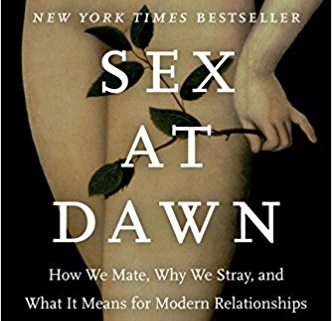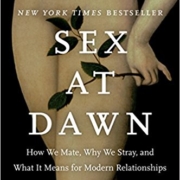Sex at Dawn – Blog
Here is a well written humorous blog and critique of one of my favourite books “Sex at Dawn” by Chris Ryan and Cacilda Jetha. The blog is written by Lea of A Litte Leaway

I shouldn’t be facetious (but I will anyway), because this is an excellent book and makes so much sense for so many reasons, even if the conclusion doesn’t really help anybody. I like the fact that they investigate claims made about primitive human culture and when they’re based on faulty data, say so. I think it’s important to challenge these oft-repeated yet less-than-accurate notions that we start to accept as “fact.” Scientists have a responsibility to come to conclusions AFTER examining data, not to go gathering data in order to confirm ideas they already hold dear. For example, Ryan and Jethá cite an example of an anthropologist who went into the Amazon and subsequently reported that the hunter-gatherer societies there are violent and make war on each other. What the anthropologist didn’t include in his findings was the fact that he went into the jungle in a boat loaded with machetes and similar, and then went from village to village making trouble by asking them about ancestors, which is poor etiquette in the Amazon. Lo and behold, trouble followed, people died, and the primitive peoples of the Amazon basin coined a new term, “anthro,” which basically means “demented person who causes serious trouble.” I love it.
Assertions that humans are essentially warlike, extrapolated from observations of chimp behavior a lá Jane Goodall, are debunked by the revelations that others who spent time researching with Goodall declared that the chimps were actually very peaceable – until Goodall brought boxes of bananas into her camp, thus setting off World War Chimp as all the chimps went to greater and greater lengths to secure all the available-yet-limited resources for themselves.
The essential theory is that we survived as hunter-gatherers by making close bonds amongst our tribes by having many sexual relations within the group. The idea being, as opposed to the idea that a woman would have sex with one man so that said man would be invested in providing for that woman and their offspring, that if women have sex with many men, then those men, not knowing which offspring is whose, will provide for all the children. There’s insurance there too, because if something happens to one man, then the other men take up the slack. Interesting idea, linked to key parties later on. So we survived by maintaining close bonds (sex as social grooming) within our group. The advent of agriculturalism then brought monogamy because there was all that property to worry about, and that’s messed us up, and now we have divorce and broken homes and it could all be prevented with open marriage. I’m kind of skimming over it here, as you can tell.
Also, our physiology, when compared with our simian relatives, argues for evolution along sexually promiscuous lines. Here we talk about penis size, testicle size and body dimorphism. Basically, we share the same body dimorphism ratios with chimps and bonobos, who have sex with multiple members of their group. And sometimes outside their group. Gorillas, the males of which species are double the size of females, have, essentially, harems, so if we were meant to be polygynous then the men would be double the size of women, and they’re not, so take that, Bountiful people (town in British Columbia known for its Mormon-ish cult of polygamous perverts).
Penis size! Male gorillas fight each other to establish harems, they don’t have to prove anything to the women, so gorilla penises are apparently a whole inch long when fully erect. In bonobos, chimps, and apparently us, “sperm competition” takes place at the cellular level, so all the sperm can go in and then they duke it out to see who wins. Well, actually it’s more of an obstacle course and may the best sperm win!
Not only that, but apparently the design of the human penis creates a vacuum in the vagina which sucks out the previous sperm deposit. I can’t go on about this because it makes me kind of queasy, but you get the idea.
So then we come to the idea of monogamy and why it fails so many. The thesis: we are so culturally ingrained with this idea of one man-one woman that when we do indulge in infidelity, the resulting hormone surge convinces us that we’re in love. When you’re in love you can justify anything. Then, because we’re also told that infidelity is a sign that the relationship isn’t working, we sever our old ties and forge new ones, destroying a family in the process. Over time, the same ennui that led to trouble the first time builds up in the new relationship, and, craving the hormone surge, we repeat this whole destructive cycle. Homes are broken up, children devastated, lawyers enriched, etc. Wouldn’t it be easier if we had “open” marriages, like the French? Or better yet, lived in communal situations and shared everything?
Hm. Maybe so, but what does THAT look like? Ryan and Jethá don’t really provide a blueprint for such a radical cultural change. And I honestly don’t know how that could work. I think I would be horrified if I had to try to live in a communal-type relationship with several men. After one has children – and I’ve done a study* – and while the children are young, most women are not very interested in sex. The idea of several men coming at me making demands, rather than just one, is appalling. It’s laughable. There just isn’t the energy. Even when the kids are a bit older (not requiring nursing, diapering, etc.) they still suck a lot of energy out of their mothers. At the end of the day – and I’ve done a study – most mothers just want to be left alone to watch Grey’s Anatomy in peace. We love our men, and one day we hope to get back in the saddle, but right now – no. Apparently amongst the Amazon tribes who practice communal sex, people who don’t participate are considered “stingy with their genitals.” There’s a t-shirt logo in that. Wouldn’t that be a good name for a softball team? “The Stingy Genitals.”
Apparently key parties originated within the tribal culture of – you guessed it – the US Air Force during World War II. I know, right? They would do some tribal “sharing” and then the men would go off to war, knowing that the 30% of them that returned would look after all the families because they’d shared this bond.
This brings us to the concept of open marriage. What I know about open marriages could fit into a walnut shell. Um, the French practice it? You hear about this but I just don’t hear enough. I know a couple that has an open marriage arrangement (according to one of the partners) but I haven’t had the opportunity to ask them how that’s working out for them and I don’t know them well so the chance will probably never come. The closest I can come in literature (where I get most of my information, let’s face it) is the depiction of partner-swapping from John Irving’s The 158-Pound Marriage in which two couples trade partners. To say that the results are messy (two of them fall in love, then everybody’s desperately unhappy) is an understatement. It’s very complicated. Ryan and Jethá cite anecdotal examples of people who derive great benefit from open marriages and also examples of people raised in multi-partner households who had a great experience. It sounds utopian (help with housework!) but I seem to remember reading about communes in the 70s and my impression was that people were not always able to adhere to the “rules” and started being jealous and possessive and then everything would go to hell in a handbasket. In order for that kind of thing to work you’d need screening and interviews and personality testing. It’s hard enough to live with one other adult; I think trying to balance the idiosyncrasies and druthers of more than two people would require a live-in marriage counsellor and professional mediator. And you’d probably have to have sex with them.
Also? I’m picturing a random group of people and someone telling them that they can all have sex within their group and that’s how you’re going to survive. The men might be ok with that, but I think the women would greet this information with frowns and defensively crossed arms. Sexual attraction is one of those impossible-to-control things and is the wild card in the “communal” scenario. It can be as weird as not liking someone’s hands, or the way they smell, or the shape of their eyes. It’s so personal. How would people agree on multiple sexual partners? My husband and I can’t even agree on pizza toppings. If we were to attempt any kind of communal arrangement the screening process would leave us with….nobody.
I brought this topic up with a group of friends – they were highly skeptical of Sex at Dawn’s conclusions and their questions were similar to mine, essentially: How does that work? In a Salon.com article, Christopher Ryan admits that they don’t really know what to do with the information. However, in the book, Ryan and Jethá assert that there are people who arrange their sexual lives this way, albeit clandestinely because society isn’t ready for it. So, they’re out there, but sightings are rare, like Bigfoot. Mind you, I’m pretty oblivious. I never seem to know when someone’s drunk until they fall down. So maybe I’m the last to know? I did hear one story about a married man who has, to date, conducted about 20 extramarital relationships that he engages in whilst on business trips. Apparently he has a set of rules (waivers?) and it seems to work for him. We don’t know if his wife knows or not, however, and if she does, what her “system” is. We talked about the movie “Hall Pass” (Owen Wilson, Jason Sudeikis) in which these two characters are always fantasizing about other women, so their wives give them a week “off” from marriage to indulge themselves and get it out of their systems. The wives realize that they are also “off” from marriage and it just goes from there. Of course the women, being Christina Applegate and Jenna Fischer, immediately attract interested men, while Owen Wilson and Jason Sudeikis strike out in numerous ways for obvious reasons. When my husband and I watched this movie we talked about the concept and my husband pointed out that he’d have to go to Agassiz (about 3 hours drive out of Vancouver) in order to have a “hall pass” because he’s so well known in Vancouver that everyone would know what he was up to. One friend said that her husband gave her permission to have an affair, as long as he didn’t find out about it. Any energy she might have had for an affair now has to go into figuring out this particular relationship Zen koan. My friends and I were all baffled. How can there be permission if there’s no knowledge?
I think that people are so complex that we can’t really say what “works” for anybody in such a general sense, or figure out everybody’s hardwiring, across the board, in this way. I do think that people need to figure out their comfort zones and need to figure out what they need to be happy, sexually and otherwise, and we need to figure out how to achieve that happiness without hurting others.
When it comes to monogamy: I agree with Ben Affleck in that marriage is work and, like him, I’m okay with that. I also think that when one is choosing a monogamous mate, it’s important to consider a lot of compatibility issues. It’s important that your visions of what you want your lives to look like correspond. If one partner wants to constantly travel the world and the other dreams of picket fences, it’s going to be challenging. If a couple doesn’t agree on issues like children, or vacations (Macchu Picchu or Waikiki?), or values, or politics, or religion, I think it’s tough to make a life together. I actually think that vacations are more of an issue than politics – because politics are an abstract that can be ignored, but a vacation takes planning and money and agreement. I don’t know anyone who’s divorced over issues of religion, but sometimes people’s jobs make life untenable and things don’t work out. I think the concrete things that affect daily life are more important than the abstract ideas that can be safely shelved. Sex, however, is a concrete thing, just as important as vacations (depends on who you’re asking). It’s a bit of a relief to be told that we’re not wired that way, but that doesn’t change anything, we can just feel less guilty for having naughty thoughts. We still live in a society that holds monogamy as a standard and condemnation, external and internal, is universal when anyone strays from that standard.
So Justin’s not going to Agassiz on a hall pass any time soon.
There are many reviews of Sex at Dawn out there, of varying quality, such as thisand these and this article by Salon.com. In the Salon article, the key interview question for me is this:
“So if monogamous marriage isn’t the right arrangement for us, what is?
We’re not really arguing for any particular arrangement. We don’t even really know what to do with this information ourselves. What we’re trying to do in the book is give people a more accurate sense of where we came from, why we are the way we are, and why certain aspects of life feel like a bad fit. I think a lot of people make a commitment when they’re in love, which is a sort of a delusional state that lasts a couple of years at most. I think it was Goethe who said that love is an unreal thing, and marriage is a real thing, and any confusion of the real with the unreal always leads to disaster.
All we’re really hoping for is to encourage more tolerance and more open discussion between men and women about sexuality and about marriage, and to come to see that marriage isn’t about sex. It’s about things that are much deeper and more lasting than sex, especially if you have children. And the American insistence on mixing love and sex and expecting passion to last forever is leading to great suffering that we think is tragic and unnecessary.”
Amen.
*”I’ve done a study” means I asked some friends. Dr. Oz uses similar sample sizes in his TV “research” so I figure it’s ok.




